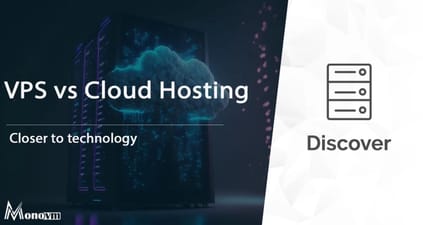 14 Dec 2021 / 3 comments
14 Dec 2021 / 3 commentsCloud Servers vs Virtual Private Servers
Both cloud servers and VPS hosting have become prominent services in the web hosting industry. Learn about them in today's article and find out which one suits your website more.
Every user has unique hosting needs. Whether you’re running apps, managing databases, or hosting websites, MonoVM Cloud VPS offers scalable, customizable solutions. Choose your resources, OS, and billing cycle to match your project and budget.
Rated 5 from 9 votes
Customize your cloud VPS with the operating system and control panel of your choice. From Linux to Windows, cPanel to Plesk, our flexible setup supports every use case
 AlmaLinux
AlmaLinux CentOS
CentOS Debian
Debian Ubuntu
Ubuntu Oracle
Oracle Rocky Linux
Rocky Linux Fedora
Fedora OpenSUSE
OpenSUSE Windows
Windows MikroTik
MikroTik FreeBSD
FreeBSD OpenBSD
OpenBSD AlmaLinux VPS Hosting
AlmaLinux VPS HostingA reliable solution for VPS hosting environments and enterprise deployments requiring a rock-solid operating system. Stability, security, and enterprise-level performance are not just benefits; they are the norm. These features are available to everyone daring to dream big and achieve more. Step into the AlmaLinux community, a community-driven Linux ecosystem tailored for those who crave a production-grade platform.
Latest Almalinux Versions
AlmaLinux 10.0 (Purple Lion) — May 27, 2025
AlmaLinux 9.6 (Sage Margay) — May 20, 2025
AlmaLinux 9.5 (Teal Serval) — November 18, 2024
AlmaLinux 9.4 (Seafoam Ocelot) — May 6, 2024
 Buy VPS Hosting with CentOS
Buy VPS Hosting with CentOSCentOS Stream 10 — December 12, 2024
CentOS Stream 9 — December 3, 2021
CentOS Stream 8 — September 24, 2019
 VPS with Debian OS
VPS with Debian OSDebian 13 (Trixie) — August 9, 2025
Debian 12 (Bookworm) — June 10, 2023
Debian 11 (Bullseye) — August 14, 2021
Debian 10 (Buster) — July 6, 2019
 Buy VPS Server with Ubuntu OS
Buy VPS Server with Ubuntu OSLatest Ubuntu Server Versions
25.10 (Questing Quokka) — October 2025
25.04 (Plucky Puffin) — April 2025
24.04 LTS (Noble Numbat) — April 2024
22.04 LTS (Jammy Jellyfish) — April 2022
 Oracle VPS Hosting
Oracle VPS Hostinglatest Oracle Linux versions
Oracle Linux 10 — June 30, 2035
Oracle Linux 9 — June 30, 2032
Oracle Linux 8 — July 31, 2019
 Rocky Linux VPS
Rocky Linux VPSLatest Rocky Linux Versions
Rocky Linux 10 (Red Quartz) — June 11, 2025
Rocky Linux 9 (Blue Onyx) — July 14, 2022
Rocky Linux 8 (Green Obsidian) — May 1, 2021
 Fedora VPS
Fedora VPSFedora 42 (Adams) — April 15, 2025
Fedora 41 — October 29, 2024
Fedora 40 — April 23, 2024
Fedora 39 — November 7, 2023
 OpenSUSE VPS Server
OpenSUSE VPS Serverlatest openSUSE Leap versions
openSUSE Leap 16.0 — October 1, 2025
openSUSE Leap 15.6 — June 12, 2024
openSUSE Leap 15.5 — June 7, 2023
openSUSE Leap 15.4 — June 8, 2022
 Buy VPS With Windows OS
Buy VPS With Windows OSLatest Windows Server Versions
Windows Server 2025 — November 1, 2024
Windows Server 2022 — August 18, 2021
Windows Server 2019 — November 13, 2018
Windows Server 2016 — August 2, 2016
 MikroTik VPS
MikroTik VPSTake control with MikroTik on MonoVM’s fast, stable, and secure infrastructure. Ideal for pros and enterprises, it offers advanced routing, firewall, full root access, remote management, and DDoS protection—all backed by 24/7 expert support.
latest MikroTik RouterOS stable release
RouterOS 7.20.1 (Stable) — Released in 2025
 FreeBSD VPS
FreeBSD VPSlatest FreeBSD versions
FreeBSD 14.3 — June 10, 2025
FreeBSD 14.2 — December 3, 2024
FreeBSD 14.1 — June 4, 2024
FreeBSD 14.0 — November 20, 2023
 OpenBSD VPS
OpenBSD VPSlatest OpenBSD versions
OpenBSD 7.7 — April 28, 2025
OpenBSD 7.6 — October 8, 2024
OpenBSD 7.5 — April 5, 2024
OpenBSD 7.4 — October 16, 2023
 cPanel
cPanel DirectAdmin
DirectAdmin ISPmanager
ISPmanager CyberPanel
CyberPanel Dokploy
Dokploy Coolify
Coolify Plesk
Plesk Webmin
Webmin VestaCP
VestaCP CWP
CWP Cpanel
CpanelOur Virtual Machine Hosting offers a customizable, robust hosting solution. Built with top-tier hardware, it delivers high-speed performance, root access, and compatibility with multiple Linux distributions for versatile functionality. Our servers are optimized for cPanel to ensure superior performance. Small business owners and personal website managers can handle multiple client projects effortlessly. Rely on our professional support team for seamless management and exceptional results. Easily manage your domains, create email accounts, and install applications using cPanel's intuitive, user-friendly interface.
cPanel System Requirements
CPU: 1.1 GHz processor (2+ cores recommended)
RAM: 2 GB minimum (4 GB recommended)
Storage: 20 GB minimum (40 GB+ recommended for production)
Architecture: 64-bit (x86_64 or AMD64)
 DirectAdmin
DirectAdminDirectAdmin VPS System Requirements
CPU: 500 MHz minimum (multi-core recommended)
RAM: 4 GB minimum (plus at least 4 GB swap memory)
Storage: 2 GB free space minimum after Linux installation
Architecture: 64-bit (x86_64 or AMD64; Intel and AMD supported, Solaris/Sparc not supported)
 ISPmanager
ISPmanagerISPmanager VPS System Requirements
CPU: 1 core minimum (multi-core recommended for better performance)
RAM: 1 GB minimum (2 GB recommended)
Disk space: 10 GB minimum (more recommended for production environments)
Architecture: 64-bit (x86_64 or AMD64)
Software: Compatible with major Linux distributions (CentOS, AlmaLinux, Debian, Ubuntu)
 CyberPanel
CyberPanelCyberPanel System Requirements
CPU: 1 vCore minimum (2+ vCores for multiple websites)
RAM: 1 GB minimum (2–4 GB recommended for smooth performance)
Storage: 20 GB SSD/NVMe (expandable for website files, emails, and databases)
 Dokploy
DokployLet the Dokploy be your ultimate partner in deployment, designed to ignite passion in your development process. Crafted for engineers and developers, it simplifies application management, turning complexity into effortless pleasure. Get started instantly with pre-configured templates for tools like Supabase, Cal.com, and Pocketbase because your time deserves nothing less than pure satisfaction.
System Requirements
CPU: 2 vCores (4+ vCores recommended for CI/CD pipelines)
RAM: 2 GB minimum (4–8 GB recommended for optimal performance)
Storage: 25 GB SSD/NVMe (expandable for builds, images, and database storage)
 Coolify
CoolifyCoolify is a comprehensive PaaS solution that seamlessly integrates with both hosted and self-hosted platforms like GitHub, GitLab, Bitbucket, Gitea, and more. Coolify simplifies deployments, resource management, and tool integration, offering endless possibilities. Best of all, it removes the hassle of server management and the complexities that come with it.
System Requirements
CPU: 2 vCores (4+ vCores recommended for multiple apps)
RAM: 2 GB minimum (4–8 GB recommended for smooth management)
Storage: 25 GB SSD/NVMe (expandable for app data, builds, and backups)
 Plesk
PleskPlesk for Linux System Requirements
CPU: 1 core minimum (multi-core recommended)
RAM: 1 GB + 1 GB swap (minimum)
Disk space: 20 GB (minimum)
Architecture: 64-bit (x86_64 or AMD64)
Software: Compatible with major Linux distributions
 Webmin
WebminWebmin System Requirements
CPU: 1 GHz minimum (multi-core recommended)
RAM: 1 GB minimum
Disk space: 2 GB minimum
Architecture: 64-bit (x86_64 or AMD64)
Software: Compatible with most major Linux distributions
 VestaCP
VestaCPVestaCP System Requirements
CPU: 1 GHz minimum
RAM: 512 MB minimum
Disk space: 20 GB minimum
Architecture: 64-bit (x86_64 or AMD64)
 CWP
CWPCWP (Control Web Panel) System Requirements
CPU: 1 core minimum (multi-core recommended)
RAM: 2 GB minimum (4 GB+ recommended)
Storage: 20 GB minimum (more recommended)
Architecture: 64-bit (x86_64 or AMD64)
 VPN Server
VPN Server  Web Hosting
Web Hosting  eCommerce Platforms
eCommerce Platforms Game Servers
Game Servers Email Server
Email Server Blockchain
Blockchain Database Servers
Database Servers Development Environments
Development Environments Trading
Trading VoIP
VoIP Remote Desktop
Remote Desktop Storage & Backup
Storage & Backup Network Tools
Network Tools Learning Platforms
Learning Platforms Automation
Automation VPN Server Use Cases for VPS Hosting
VPN Server Use Cases for VPS HostingA VPS (Virtual Private Server) provides an ideal foundation for building your own VPN (Virtual Private Network), giving you full control over encryption protocols, network routing, and data privacy. Unlike shared VPN providers, a VPS-based VPN ensures dedicated resources, consistent speed, and no third-party logging — key signals of trust and transparency.
You can easily deploy leading VPN protocols such as:
By using your VPS as a VPN server, you gain speed, privacy, and control — turning your hosting environment into a private network gateway within your own trusted infrastructure.
 Web Hosting Use Cases for VPS Hosting
Web Hosting Use Cases for VPS HostingTypical use cases include hosting multiple websites, managing CMS platforms like WordPress, and running custom web apps with full server control.
A VPS gives you dedicated power, flexibility, and reliability to host without limits.
 E-commerce Use Cases for VPS Hosting
E-commerce Use Cases for VPS HostingCommon use cases include:
A VPS ensures fast performance, data security, and room to scale — essential for growing online businesses.
 Game Servers
Game ServersA VPS is perfect for hosting private or community game servers with full performance control and low latency. You can easily deploy popular titles like Minecraft VPS, CS:GO, and Rust, configure mods, and manage players securely.
Common use cases include:
A VPS gives gamers dedicated power, low ping, and freedom to customize every aspect of their gaming experience.
 Email Server Use Cases for VPS Server
Email Server Use Cases for VPS ServerCommon use cases:
A VPS mail stack delivers deliverability control, security, and scalability you can’t get from shared hosting.
 Blockchain & Crypto Node Use Cases for VPS
Blockchain & Crypto Node Use Cases for VPSYou can host major nodes such as:
Common use cases:
A VPS-based crypto node ensures decentralization, data sovereignty, and continuous uptime for blockchain enthusiasts and developers alike.
 Database Server Use Cases for VPS Hosting
Database Server Use Cases for VPS HostingYou can deploy leading database engines such as:
Common VPS database use cases:
A VPS database setup ensures fast query performance, secure storage, and full administrative freedom — key factors for data-driven applications and scalable infrastructures.
 Development Environment Use Cases for VPS Hosting
Development Environment Use Cases for VPS HostingCommon use cases:
A VPS-based development environment provides speed, control, and isolation, empowering teams to innovate without dependency limits.
 Trading Use Cases for VPS Hosting
Trading Use Cases for VPS HostingYou can deploy trading platforms and tools such as:
Common use cases:
A VPS ensures speed, reliability, and independence — essential for professional traders operating in Forex, crypto, or automated trading ecosystems.
 VoIP Use Cases for VPS Hosting
VoIP Use Cases for VPS HostingCommon use cases:
A VPS-hosted VoIP solution ensures low latency, secure communication, and full control over your telephony infrastructure
 Remote Access Use Cases for VPS Hosting
Remote Access Use Cases for VPS HostingYou can configure it for:
Common use cases:
A VPS enables secure connectivity, persistent uptime, and cross-location flexibility — making it ideal for remote teams and professionals.
 Storage & Backup Use Cases for VPS Hosting
Storage & Backup Use Cases for VPS HostingCommon use cases:
A VPS-based setup ensures data privacy, redundancy, and complete ownership — ideal for businesses and individuals seeking independent cloud or backup solutions.
 Networking & Monitoring Use Cases for VPS Hosting
Networking & Monitoring Use Cases for VPS HostingCommon use cases:
A VPS provides dedicated performance, high availability, and network-level control, making it the perfect environment for system administrators, DevOps teams, and network engineers managing complex infrastructures.
 E-Learning Use Cases for VPS Hosting
E-Learning Use Cases for VPS HostingCommon use cases:
A VPS-based LMS ensures high uptime, data privacy, and scalable performance, making it the perfect foundation for educators, institutions, and online academies.
 Automation Use Cases for VPS Hosting
Automation Use Cases for VPS HostingCommon use cases:
A VPS-powered automation stack ensures speed, control, and privacy, ideal for developers, startups, and tech communities automating repetitive operations.
All Linux VPS plans come with full root access through SSH, while all Windows VPS services include full administrator rights. Whether you choose cloud-based VPS, managed cloud VPS, or VPS cloud hosting, you can install all essential software and cloud VPS web hosting control panels based on your plan preferences.
Once your order is confirmed, our Linux-based VPS cloud services activate in seconds. For Windows users, setup is complete within two minutes. This rapid deployment ensures minimal downtime, especially beneficial for time-sensitive workloads such as cloud VPS for Forex or high-traffic applications.
With MonoVM’s hosting cloud VPS options, you get the flexibility to choose from multiple preconfigured control panels. If your preferred one isn’t listed, full root or administrator access allows you to install any panel manually. This is a standard feature in our managed cloud VPS hosting plans, giving you greater autonomy and system-level control.
As one of the trusted cloud server providers, our team of IT experts is available around the clock. Whether you need help with software configurations, system issues, or security concerns, our specialists are trained to support all aspects of cloud server services and infrastructure.
Our in-house panel gives you significantly more control over your virtual machine. All VPS cloud users can now directly manage their environments by starting, stopping, rebooting, or accessing via SSH or VNC. You can reinstall operating systems, deploy control panels, and manage apps with ease. This level of access, combined with competitive cloud VPS pricing, ensures that your server is tailored to your needs.
Every VPS is secured with our advanced cloud server security protocols. Whether you are using a standard plan or opting for cloud VPS managed solutions, your data and performance are safeguarded with enterprise-grade measures.
The VPS is a private, dedicated hosting environment deployed on a host server or a cluster using powerful virtualization technologies. Think of it as a virtual version of a physical server, offering you full control and dedicated resources. Among cloud VPS providers, MonoVM stands out by offering scalable solutions, including cloud VPS hourly flexibility and robust cloud VPS hosting tailored for professionals, developers, and businesses alike.

Your honest review is the best proof of a great customer experience. Leave your comments on the client's dashboard and help others with your candid review.
Most companies don’t accept Bitcoin, and that’s the main reason I prefer to choose Monovm.
AlexI'm new here and ordered a starter site. They’ve been in contact with me every day, and my site is now online. So far, I’m really satisfied with their service and support.
It’s great to have access to experts who can guide me through live chat, which is why I’ve been registering my domains and emails with Monovm for several years.
If you have any other questions about Cloud VPS hosting, then take a look at the following questions and answers. We gathered the most asked questions and provided straightforward answers:
Cloud VPS stands for Cloud Virtual Private Server — a scalable and flexible hosting solution where your server runs within a virtualized cloud environment. Unlike traditional VPS, it’s not dependent on one physical server, ensuring higher uptime, resource flexibility, and reliability for businesses and individuals alike.
Cloud VPS hosting is a hybrid solution that combines the power of VPS with the scalability of cloud computing. It allows users to host applications, websites, or systems on a virtual server backed by robust cloud server infrastructure, offering seamless performance and dynamic resource allocation.
VPS Cloud refers to a virtual private server hosted within a distributed cloud server infrastructure. Unlike traditional VPS on a single server, VPS Cloud offers better failover protection, more scalability, and enhanced performance thanks to load balancing across multiple nodes.
Top cloud server service providers like MonoVM offer highly customizable VPS plans, worldwide data center locations, instant provisioning, and 24/7 support. A good provider should deliver excellent uptime, strong security protocols, flexible plans, and powerful infrastructure tailored to your needs.
A cloud server application can be anything from websites, content management systems, and development frameworks to databases, ERP/CRM software, and cloud-based business tools. Cloud VPS is highly suitable for hosting Forex trading platforms, game servers, email servers, and more.
The cloud server hosting price varies depending on factors like CPU, RAM, storage, bandwidth, and whether it's managed or unmanaged. At MonoVM, plans start affordably, with the flexibility to scale resources on demand without long-term commitments.
Cloud server infrastructure is the backbone of cloud computing. It consists of virtualized servers, storage systems, network components, and software platforms that allow users to deploy scalable, redundant, and secure virtual environments across multiple data centers worldwide.
Absolutely. MonoVM offers cloud VPS with cPanel for easy server management through a user-friendly interface. With cPanel, you can manage domains, emails, databases, and files effortlessly — making it perfect for web developers and hosting resellers.
Yes! You can configure your cloud server with VPN access for secure remote connections, encrypted data transfers, and anonymous browsing. Whether you're running a personal VPN or need one for business-level security, our infrastructure supports full VPN integration.
Discover our VPS hosting Knowledgebase, offering the latest tech updates, industry news, and in-depth tutorials. Stay ahead in the virtual private server realm and maximize your hosting experience.
 14 Dec 2021 / 3 comments
14 Dec 2021 / 3 commentsBoth cloud servers and VPS hosting have become prominent services in the web hosting industry. Learn about them in today's article and find out which one suits your website more.
 10 Jun 2024 / 2 comments
10 Jun 2024 / 2 commentsDiscover the differences between VPS and Cloud Hosting. Learn which is best for your website needs in our comprehensive guide.
814-750xAuto.webp) 12 Feb 2025 / 1 comments
12 Feb 2025 / 1 commentsLearn about the Virtual Private Cloud (VPC), how it works, and all the benefits and challenges accompanying it in real-world scenarios. Discover VPC services offered by major cloud providers.